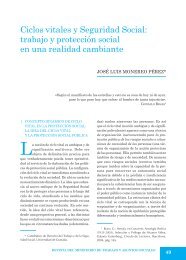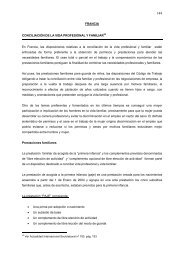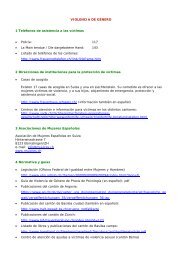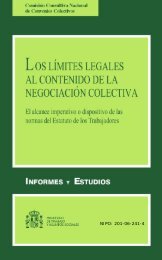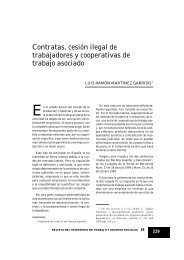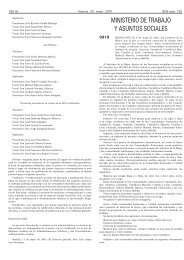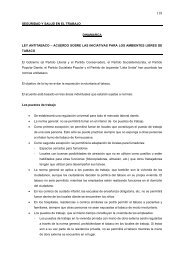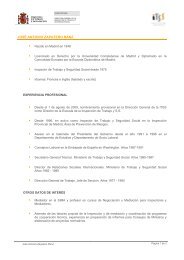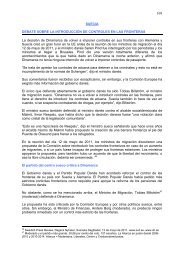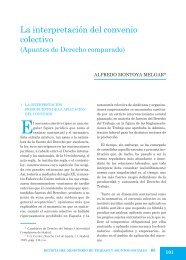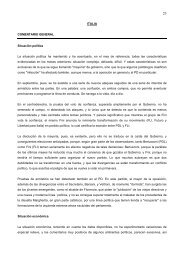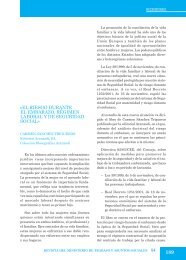Número 93: Derecho del Trabajo - Ministerio de Empleo y ...
Número 93: Derecho del Trabajo - Ministerio de Empleo y ...
Número 93: Derecho del Trabajo - Ministerio de Empleo y ...
You also want an ePaper? Increase the reach of your titles
YUMPU automatically turns print PDFs into web optimized ePapers that Google loves.
ESTEBAN RODRÍGUEZ VERA<br />
ABSTRACT In this paper, the author takes a critical look at the collective bargaining mo<strong><strong>de</strong>l</strong> applied to<br />
public employees, whose main characteristic is the existence of two collective and very different<br />
bargaining systems, i.e. one for public servants and one for contract personnel.<br />
Firstly, the paper analyses the regulation of collective bargaining within the Basic<br />
Statute of Public Employees and comes to the conclusion that such Statute is trying to<br />
maintain the status quo. That is to say, on the one hand, it mainly maintains the dual collective<br />
bargaining mo<strong><strong>de</strong>l</strong> of public employees, already in existence in previous legislation.<br />
On the other hand, it does not make any progress in the rapprochement or convergence of<br />
collective bargaining systems of public servants and contract personnel, given that important<br />
differences still exist with regards to the following aspects: the subjects who have the<br />
legitimacy to negotiate, the <strong>de</strong>finition of the negotiating frame or unit, the negotiable<br />
instruments, the repercussions <strong>de</strong>rived from a failed negotiation, and so on. Furthermore,<br />
the Statute neither regulates the specialties existing in the collective bargaining system<br />
of contract personnel nor does it resolve the problem of insufficient regulation of the joint<br />
collective bargaining, both of which aspects had been repeatedly stated.<br />
The analysis of public employees' collective bargaining is focused on the differences<br />
between their collective bargaining and the one affecting private sector workers. The<br />
paper reveals how such differences are mostly translated into limitations or restrictions<br />
on the public employees' collective bargaining. The origin and foundations of such limitations<br />
or restrictions are analysed and i<strong>de</strong>ntified: on the one hand, the presence of Public<br />
Administration in the negotiation <strong>de</strong>termines or limits public employees' collective bargaining<br />
in so far as it is bound by principles or rules which are not applied to private companies<br />
and which condition and restrict its bargaining capacity. On the other hand, the<br />
priority of the principle of legality over that of collective autonomy applied in the case of<br />
Public Administration, together with the safeguarding of the general interest whose<br />
<strong>de</strong>fence belongs to Public Administration, sometimes <strong>de</strong>termines and limits public<br />
employees' collective bargaining. Lastly, the participation of Public Administration in<br />
contract personnel's collective bargaining forces an adjustment of certain aspects of the<br />
rule governing such negotiation — Title III of Workers' Statute. Then, the paper analyses<br />
the specific limitations imposed on public employees' collective bargaining in <strong>de</strong>tail,<br />
which stem from rules governing Public Administrations action, and which subject such<br />
negotiation to specific principles, such as the legality principle, including budgetary legality,<br />
budgetary coverage, good faith, and so on. Furthermore, limitations to public employees'<br />
collective bargaining inclu<strong>de</strong>d in budgetary acts are specially analysed. Out of these<br />
limitations, the yearly maximum ceiling, which cannot be excee<strong>de</strong>d, limiting public<br />
employees' remuneration stands out. Moreover, the principle of normative hierarchy with<br />
respect to the collective bargaining act is analysed, and the cases in which the Administration<br />
can dissociate itself unilaterally from the agreed collective bargaining.<br />
The paper makes an interesting analysis of two recent experiences affecting public<br />
employees' collective bargaining in which the Government modified an agreement signed<br />
with tra<strong>de</strong> unions representing public employees through two effective royal <strong>de</strong>cree-law.<br />
The Government also modified contract public employees' working conditions, which were<br />
agreed upon in effective collective agreements. The above experiences have resulted in<br />
Royal Decree-Law 8/2010, of 20th May, affecting all public employees, and Royal Decree-<br />
Law 1/2010, of 5th February, affecting air traffic controllers alone.<br />
Finally, throughout the paper, criticism ma<strong>de</strong> to the public employees' collective bargaining<br />
mo<strong><strong>de</strong>l</strong> is reflected. However, the paper conclu<strong>de</strong>s by i<strong>de</strong>ntifying the main critical<br />
points of such mo<strong><strong>de</strong>l</strong> and pointing to some plausible future solutions.<br />
REVISTA DEL MINISTERIO DE TRABAJO E INMIGRACIÓN <strong>93</strong><br />
209



